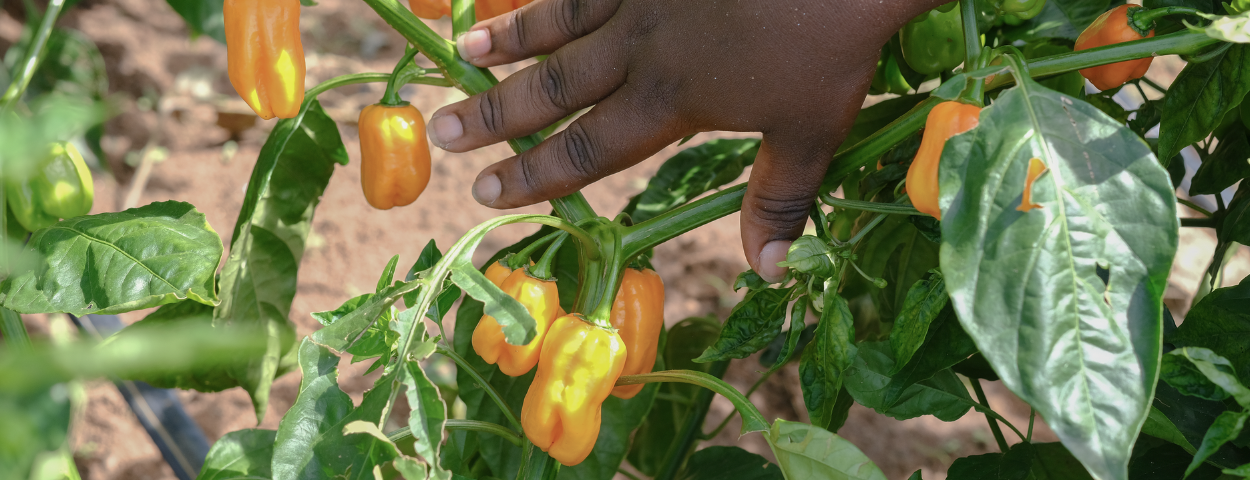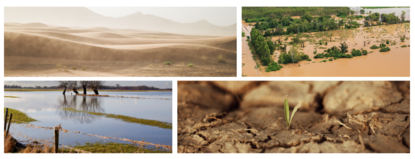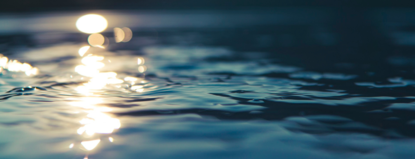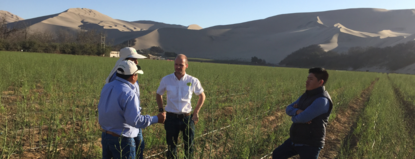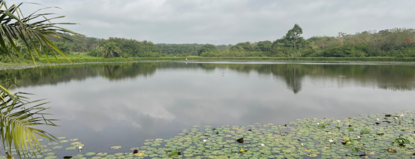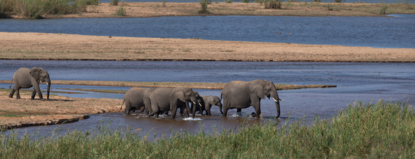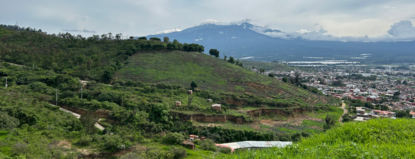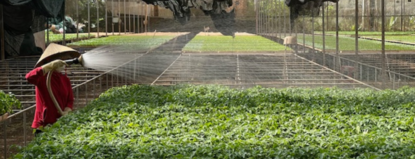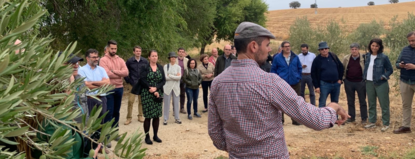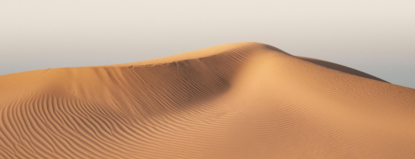The Netherlands Water Partnership (NWP) and Netherlands Food Partnership (NFP) are two organizations collaborating with multiple stakeholders on two important topics: water and food. With expectations of 50% of all arable land being salinized by 2050, salinization is rapidly becoming one of the biggest challenges to food production worldwide. Since 2021, NWP and NFP are working together on the Saline Water and Food Systems (SWFS) partnership which focuses on the intersection between water and food. Martijn van Staveren (NWP) and Babette Bodlaender (NFP) tell us more about the ambitions of the SWFS partnership, and how international knowledge exchange as well as cross sectoral collaboration are crucial for driving positive change regarding the challenge of salinity.
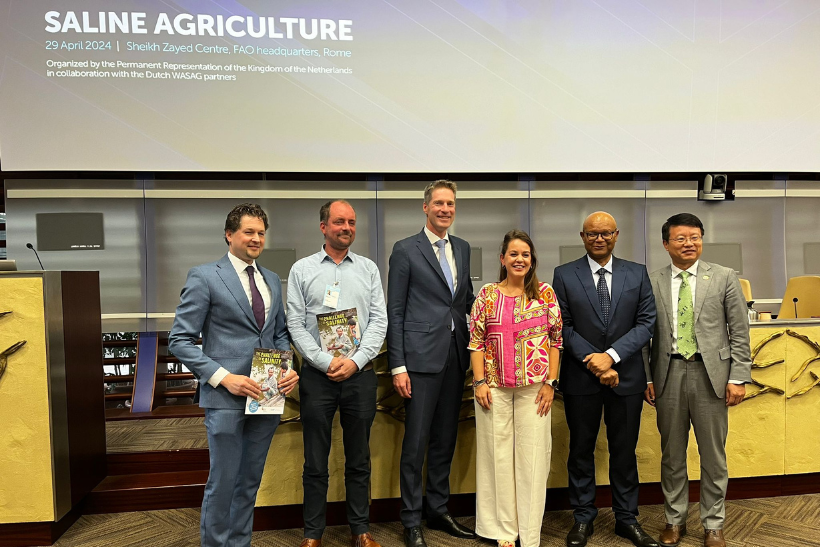
Can you start by explaining the roles of NWP and NFP and how they are addressing the issue of salinization?
Martijn van Staveren (NWP): “Absolutely. The Netherlands Water Partnership (NWP) is the network organization for the Dutch water sector. We represent a broad spectrum of stakeholders including private companies, research institutions, government bodies, and NGOs, all of whom are involved in international water collaboration. Our mission is to unify and promote the Dutch water sector's international ambitions and expertise.This increasingly includes collaboration with the food sector. As a result, we now implement a number of initiatives, partnerships, and also programs that are focused on the water and food nexus, in close collaboration with organizations in both sectors.”
Babette Bodlaender (NFP): “The Netherlands Food Partnership (NFP) focuses on sustainable food systems and their transformations, particularly in low and middle-income countries. Like NWP, we are a network organization, and we connect the 'Dutch Diamond'—public sector, private sector, research institutions, and civil society—around sustainable food systems. Since 2021, we’ve been co-leading the Saline Water and Food Systems (SWFS) partnership with NWP, addressing the intersection of water and food, particularly the growing issue of salinity.”
"Through connecting our networks, we aim to address salinization from a cross-sectoral perspective."
How does the SWFS partnership contribute to addressing salinity challenges?
Van Staveren: “Through connecting our networks, we aim to address salinization from a cross-sectoral perspective. It is a challenge that impacts agriculture, ecosystems, and ultimately, food security. The SWFS partnership is not just about linking the Dutch water and food sectors but also about establishing meaningful connections in low and middle-income countries where salinization is a critical issue. Our focus is on knowledge exchange, capacity development, and fostering partnerships.”
Bodlaender: “Exactly. We work together to ensure that the Dutch expertise in water and food systems can have a tangible impact in regions affected by salinization. For instance, we’ve set up a Seed Money Facility, which provides initial funding for innovative projects. This has led to some concrete actions on the ground. Upcoming projects will be implemented in Senegal, Bangladesh and Mozambique that address salinity challenges through new agricultural practices or improved water management.”
Could you tell us more about how the SWFS partnership contributes to knowledge exchange?
Bodlaender: “One of our flagship initiatives is the Saline Agri Map. It’s a platform that provides a comprehensive overview of projects related to saline agriculture, making information more accessible to a broader audience. The map was developed in collaboration with the Vrije Universiteit Amsterdam, and it serves as a valuable resource for anyone working in saline agriculture."
“The map is also an excellent tool for connecting different stakeholders—whether they are researchers, policymakers, or practitioners—who are working on saline agriculture projects. By making this information more accessible, we’re helping to bridge gaps and foster collaboration that can lead to interventions."
Van Staveren: "This year we also launched the first edition of the Salinity Magazine. It provides introductions to the challenge of salinization and highlights various perspectives and projects examples from the Netherlands and abroad, featuring both Dutch and international experts. It’s part of our broader effort to make knowledge accessible and to share best practices.”
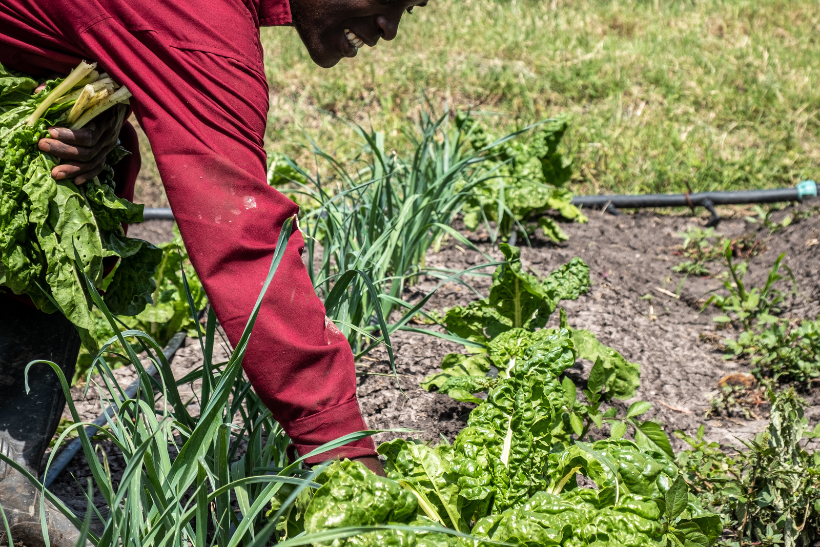
What approaches do you use for managing salinity?
Van Staveren: “When dealing with salinity, we approach it through three possible strategies: prevention, mitigation, and adaptation. Prevention involves taking steps to avoid the onset of salinity by managing land and water use practices effectively. Mitigation focuses on reducing the impact of salinity through for example improved drainage and soil management. Adaptation involves adjusting agricultural practices or choosing salt-tolerant crops when salinity cannot be prevented or mitigated.”
Bodlaender: “These strategies align well with our objectives in the SWFS partnership. For instance, in cases where prevention and mitigation are not feasible, adapting to salinity by selecting appropriate crops or modifying farming practices becomes crucial. This approach ensures that we address salinity comprehensively and sustainably.”
"Our goal is to ensure that Dutch expertise is effectively utilized in these regions, and LAN is a crucial partner in this effort.”
How do you collaborate with the Netherlands Agricultural Network (LAN) worldwide?
Bodlaender: “We maintain regular contact with LAN, especially with agricultural counselors in regions where salinity is a significant issue. For instance, the Agricultural Counselor in Vietnam asked us to support an incoming trade mission to Vietnam, where the topic of salinity came back in a panel discussion. We’ve also collaborated on trade missions to Morocco and other countries. Our goal is to ensure that Dutch expertise is effectively utilized in these regions, and LAN is a crucial partner in this effort.”
Van Staveren: “Additionally, we participate in events like the LAN Briefing Conferences, also known in Dutch as the ’Terugkomweek’, where we connect with agricultural counselors to discuss ongoing issues in their regions. This helps us stay informed about emerging challenges and opportunities for collaboration. LAN is an essential channel for us to bring Dutch solutions to the forefront in international contexts and we would be happy to hear if salinity is, or is becoming, an issue in their working area.”
Bodlaender adds, "On a global level, the SWFS partnership is elevating the issue of saline agriculture on the political agenda through a range of initiatives. In December 2023, the SWFS partnership, in collaboration with various stakeholders, hosted a session at COP28, titled: Promoting the Declaration of 2028 as the “Year of Saline Agriculture”. In addition, last April, we hosted a session on salinity at the Food and Agricultural Organization (FAO) in Rome during the WASAG Technical Meeting."
Can you elaborate on how salinity interventions intersect with biodiversity?
Van Staveren: “That’s a fascinating aspect of our work. Salinity doesn’t just impact agriculture—it also plays a crucial role in supporting rich ecosystems, particularly in coastal areas. Brackish environments, like the Sundarbans and other mangrove forests, are rich in biodiversity and provide critical ecosystem services. Here, the balance with water needs for food production needs to be found.”
"However, in arid agricultural areas, salinity can also lead to land degradation and desertification. As a result, farmers may convert neighboring land to agricultural areas, leading to further habitat destruction and biodiversity loss. Desertification and changes in land use are the main drivers of biodiversity loss worldwide."
Bodlaender: “We’re exploring these connections further, particularly as we prepare for events like the upcoming Biodiversity COP. We’re looking at how salinity management can contribute to broader biodiversity goals, especially in living soils, and how these goals can, in turn, support sustainable agriculture.”
Any final thoughts or messages for our readers?
Van Staveren: “I’d like to highlight that the SWFS partnership is part of a broader effort to integrate water and food management strategies, which is also prominent in the Water for Food programme, coordinated by NWP. Our work is based on the principle that complex problems like salinization require cross-sectoral approaches. Whether you’re working in water, agriculture, or biodiversity, there’s a role for everyone in addressing the challenges posed by salinity."
